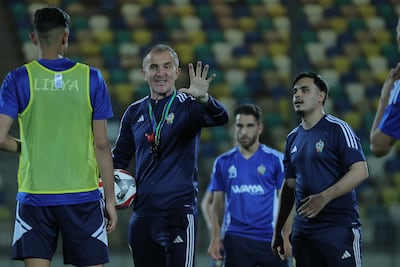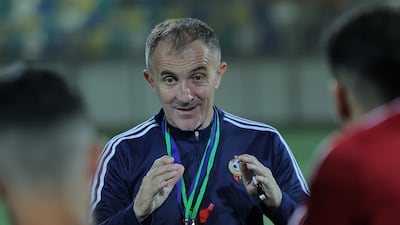Two years and five days from now the curtain will rise in Mexico City on the biggest and most inclusive World Cup that football has ever staged.
Invitations will be extended to 45 nations besides co-hosts: the USA, Canada and Mexico. It is guaranteed there will be debutants, new countries, taking part at the sport’s great showpiece.
Among them, or so they dream, might just be North Africa’s sleeping giant, the one Mediterranean nation from Africa never to have made it to a World Cup finals.
Right now, Libya are showing the sort of form all their near neighbours would envy. A sample of the last five international matches played by Morocco, semi-finalists at the 2022 World Cup, Tunisia, Algeria and Mohamed Salah’s Egypt has none of those heavyweights as potent as Libya, with their dozen goals from five games so far in 2024, extending an unbeaten run that stretches back over 11 games.
Beat Mauritius in Benghazi on Thursday, and a belief that Libya’s renaissance could lead them to North America in the summer of 2026 will grow.
Quite a renaissance it has been, too. This time a year ago, Libya, the so-called ‘Knights of the Mediterranean’, were on their way to finishing bottom of their qualifying pool for the last Africa Cup of Nations. They were under the care of a third different head coach in as many months.
The Libyan Football Federation then reached out to an old Africa hand, the Serbian coach Milutin ‘Micho’ Sredojevic to take over. His 22 years managing in Africa, an odyssey taking in trophy success at Egypt’s Zamalek and Sudan’s Al Hilal, plus two spells at South African giants Orlando Pirates and jobs in charge of three different national teams, meant he needed no reminding of Libyan football’s potential. Nor that over the past decade, since a team of great promise won the African Nations Championship – the CHAN, the international tournament reserved for players at African clubs – it has remained stubbornly unfulfilled.

The objective set to the new manager was threefold: qualify for next year’s Afcon in Morocco, for the next CHAN, and try to seize the opportunity offered by the World Cup’s expansion to 48 finalists, nine of whom will come from Africa, perhaps 10 taking in the play-off rounds.
“We’re all happy with the fact Africa has now got, effectively, nine-and-a-half places at World Cup 2026,” Micho tells The National.
But he cautions: “When you look at everything, we are in a very tough qualifying group, including, in Cameroon, Cape Verde and Angola, three of the teams that reached the last 16 of the Africa Cup of Nations in January.”
Micho looked at the challenges and still said yes to managing Libya. “It was a huge task, a mountain to climb from a sporting perspective, given the team hadn’t won a game in 10 months, a team that had been in disarray in terms of relations within it, because people were nervous at the results.”
Under the new boss, a clean slate. The first set of World Cup assignments kept the dream nourished, not least a stirring comeback to draw with Cameroon in Benghazi.
Libya sit on four points from their first two matches, equal with Cameroon and Cape Verde, where they go next week for what Micho is already calling “The Battle of Praia”, the venue being the Cape Verdean capital, a key fixture in the qualification process that rolls on until next November. The group winners will go directly to the World Cup, the second-place finishers into a series of knockouts for the right to claim a potential play-off spot at the finals.
Micho’s squad for the month’s two games, Mauritius at home, Cape Verde away, is drawn almost entirely from the Libyan Premier League, a division ranked just outside the top 10 domestic leagues in Africa, and for all the disruptions to it through the country’s political strife since 2011, still a nursery for technically gifted, driven players. “I see the Libyan Premier League as extremely strong,” says Micho. “And we’re proud of it.”
It is also a generous league to footballers from elsewhere in the Mena region. Its big clubs are attractive to Moroccan, Algerian and Tunisian professionals, and new rules are coming into place to allow limits on foreign players to be lightened if clubs want to contract players from Sudan or Palestine because of the conflicts there.
For the national coach, seeking as wide a pool of Libyan talent to pick his squads from, that might be problematic. “It could be judged as meaning less space for young Libyan players,” acknowledges Micho. “But I see it as a way to make them stretch themselves, fight harder for their places and find the best version of themselves.”
As soon as he took over, Micho sought to stimulate the up-and-coming footballers of the local league. His first three squads had an average age of 22, although he still looks to the savvy of veterans like playmaker Faisal Al Badri, a star of the 2014 CHAN, and he has reached out to 35-year-old Al Ahli striker Ahmed Krawa’a to help lead an increasingly effective attack. “We’ve gradually added players with more experience and with good human qualities, and built a feeling of belonging,” he adds.
There are conspicuous absentees. Two weeks ago, Libya’s highest profile current footballer, Almoatasembellah Al Musrati, scored the late winning goal for Besiktas in a cliffhanger Turkish Cup final. “He’s a great ambassador for Libyan football,” says Micho of Al Musrati, before explaining that the 28-year-old midfielder, who played Uefa Champions League football with his former club Braga last season, has not added to his 42 caps in the past year because of the player’s perceived reluctance to be available for all fixtures.

The German-born midfielder Daniel Elfadli, of Bundesliga 2 club Magdeburg, is not in this month’s squad either. He told the coach he felt needed some rest after a long club season. Micho will not close the door long-term on either of them, but talks pointedly of creating a national team culture where “we should not need to beg players to come. I’m looking for players who are hungry to play for Libya, not thinking they are untouchable or too big for the national jersey.”
What Libya will continue to do is scour the country’s diaspora, and, noting how Morocco, Algeria and Tunisia have strengthened their squads with dual-national footballers, often born in Europe, seek to persuade eligible footballers that committing a senior international future to Libya can mean taking part in major tournaments.
Qualifying for the next Afcon, an event Libya have not been at since 2012, would help those arguments if they were ever put to, say, Almugera Kabar, the exciting German-born 18-year-old left-back at Borussia Dortmund. He has Libyan heritage, and is tipped for a brilliant career.
Beyond the longer-term speculations, a home-grown, home-based Libya are already punching above their weight, roused by the motivational messages that reach players’ mobile phones daily from the industrious, charismatic Micho. They are encouraged to feel they are flag-bearers for seven million compatriots at home and the tens of thousands of Libyans abroad.
“I’m not a politician, but I do believe football can be an enormous, amazing uniting factor,” says Micho. “All my players have gone through hardships at times in their lives. And Libyans have been suffering through many years of hardship – political, economic or from things like the terrible floods of last year.
“Football can be a healing factor, a driving force that makes Libyans happy. It can be a medicine to unite souls. Football can be that sweet honey that makes life more enjoyable.”


